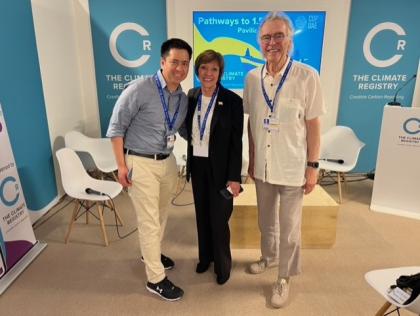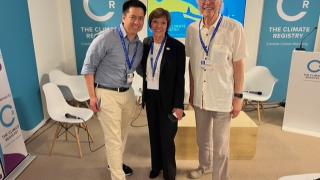Jonathan Pershing is the Environment Program Director at the William and Flora Hewlett Foundation. The Hewlett Foundation is one of the largest philanthropic organizations in the United States, based in Menlo Park, California.
Rick Theis is the Secretary/Treasurer of the Fledgling Fund. The Fledgling Fund is a small family foundation based in Sebastopol, California. Rick attended COP28 with the Fund’s grantee, The Climate Center, to learn more about how climate activism is shaping COP.
What issues were you focused on at COP28?
Rick: Rapid phase out of fossil fuel and nature-based carbon sequestration were high on the list. I was also interested in learning more about the broad scope of COP and how small NGOs’ participation can be of benefit.
Jonathan: I was focused on identifying how philanthropy can encourage cooperation and collaboration so we can move more rapidly toward a clean energy future. This included solutions for a just transition; philanthropic support for the reduction of super pollutants; bolstering newly developed climate finance mechanisms to support emerging economies confronting loss and damage; the role of mis- and disinformation in undermining progress on climate change, and so much more…
What successes came out of COP28?
Jonathan: Countries reached the same conclusion as scientists and analysts around the world: despite significant progress to reduce global emissions, the world is not on track to meet the global temperature target adopted in Paris in 2015. To address that shortfall, they have re-committed themselves to update their national plans and to take additional efforts.
But a commitment is just the start. The proof of impact will be in implementation. Government, private industry, civil society, and philanthropy all play crucial roles if we are to meet the goals set in Dubai, and avoid further widespread damages that will result from our current trajectory. In addition to global emissions reductions, we must also accelerate the pace of adapting to climate change. We must dramatically increase funding for the financing mechanisms required to support the energy transition, and loss and damage in developing economies.
Rick: COP28 was not very successful in articulating a new and compelling mandate.
The policy by consensus rules of COP are unable to lead the world in addressing climate change, which means NGOs need to work harder at the local, state, and national levels to advocate for public policy that will accelerate the phase-out of fossil fuels and the rapid creation of renewable energy that is cheaper and more equitable.
For NGOs attending, there was heightened resolve to: 1) Decrease fossil fuel extraction quicker and invest more in renewable energy resources. 2) Not be taken in by false net-zero and carbon capture and sequestration--which are schemes by fossil fuel companies that prolong extraction. 3) Ensure a just transition and be clear about what we mean by a just transition.

Mike Young, California Environmental Voters; Karen Ross, Secretary of the California Department of Food and Agriculture; and Rick Theis, Secretary/Treasurer of the Fledgling Fund; following a COP28 presentation sponsored by The Climate Center on "Harnessing the Power of Nature in Achieving 1.5 C."
Each year, COP delivers outcomes that affect global climate policy, finance, and action. What opportunities are there for funders to coordinate place-based work with investments at the federal and global level?
Jonathan: The Hewlett Foundation is taking the signals from COP28 as a starting point for our own continued global effort to ensure people and the planet can flourish. This means:
- Working at the national level to support countries to make more rapid progress on their updated national plans;
- Taking a more place-based approach that can ensure communities benefit from a clean energy transition;
- Supporting work to reduce barriers to the rapid penetration of renewable energy;
- Helping build a workforce that can support a clean energy transition;
- And supporting civil society with stories of progress to better understand the problems and solutions.
Looking ahead, what's at stake for COP29 and COP30? Why should funders pay attention?
Jonathan: If we do not rapidly transition to a low carbon economy – and use every milestone at our hands to ensure compliance matches the pledges already made, the climate will continue its march to greater warming. Emerging economies, and disadvantaged communities everywhere, which have contributed the least to our climate crisis will especially lose out. At COP29 and COP30, I’m looking to see if countries are actually living up to their commitments and for how we can help them innovate and strike a path forward.
Rick: The COP29 presidency is in the hands of another oil-dependent country. A meeting in Azerbaijan will stymie an aggressive approach to reducing fossil fuel extraction. It’s important that we fund NGOs to attend COP, because it’s a venue where world leaders and activists interact to more clearly see the issues and articulate solutions, some new and some bold.
Finally, when COP28 President Sultan al-Jaber was addressing a plenary session near the close of the conference, a young activist stormed the stage shouting, “WE NEED ACTION!” As she was gently escorted off the stage, the audience of delegates and observers broke out in tumultuous and prolonged applause that the COP President and fossil fuel producing nations could not ignore.
This interview has been edited for length and clarity.



